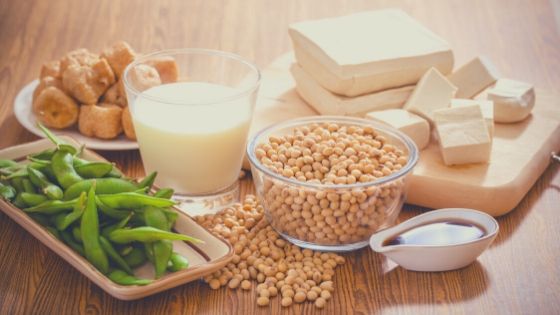I’m going to share a personal story about myself. I was a colicky baby. According to my mother, I screamed all the time and was very difficult to feed.
This was the 80’s and breastfeeding was out of fashion. They struggled to find a baby formula my tiny tummy could tolerate.
Eventually, she started using a soy-based formula. My gases calmed down and my poor mother could sleep. They found a miracle in those cans of soy formula. At least that’s how my mother tells it.
Nowadays, soy has been getting a bad rap, and not without its reasons. It’s blamed for a whole range of ills from upset stomach to hormone imbalances.
Today, I want to talk about a frequent question I encounter. And considering my own personal experience, this question fascinates me.
Does soy protein cause gas?
The basic answer – yes. Soy protein does cause gas. Like most other beans, peas and other legumes, soy contains compounds called oligosaccharides. These three which I’ll cover in more detail, verbascose, stachyose, and raffinose are the primary culprits in flatulence caused by soy.
Why? These compounds are indigestible. In our guts, they go through a fermentation process that causes gas and flatulence.
But not all soy protein is created equal. Soy protein can be found in minimally processed soy flour, soy protein concentrate, and soy protein isolate. Depending on which type of soy protein you’re consuming, you may be more likely to experience gas and stomach discomforts.
Three Different Kinds of Soy Products

Are you using a soy-based protein supplement or consuming soy products as part of a well-balanced diet? If so, take a moment to look at the label on the products you are consuming.
If you are experiencing excessive gas, the reason might be found in the ingredient list.
As I mentioned, soy protein is commercially available in three different forms.
If soy is causing you gas it has a lot to do with what kind of soy protein you are consuming.
Soy Flour
The most natural and unrefined soy flours are essentially “whole grain”. The whole bean is ground up into fine flour or coarse meal.
All, or nearly all, fats, starches, and carbohydrates present in the whole bean are present in the flour.
There are three different kinds of soy flour:
- whole soy flour
- defatted soy flour (which usually boasts more than 50% protein)
- lecithinated soy flour (soy lecithin is added to defatted soy flour to make it more “mixable” with water).
Of all the different kinds of soy products, these soy flours are the most minimally processed.
They are, however, the most likely to give you gas.
This is because soy flour contains all of the components in the whole bean. That’s right. It is high in oligosaccharides.
A Word about Oligosaccharides:
It’s worth noting that if you are lactose intolerant, there is a strong likelihood that you will suffer more intensely at the hands of oligosaccharides. For others, these compounds may not necessarily cause discomfort.
Every human body reacts to these compounds differently. Some people are unaffected while others show extreme reactivity. It has a lot to do with your gut bacteria in the large intestine and colon.
It also has to do with how much soy products you are consuming. 30g of soy flour will cause you less gas than 80g.
Soy Protein Concentrate
Soy protein concentrate (SPC) is a product that is quite a bit more refined, though not as intensely processed as soy protein isolate.
Most carbohydrates are removed from the soybean while leaving most of the fiber.
As the name suggests, SPC has a much higher concentration of protein – usually greater than 70%.
Does soy protein concentrate cause gas?
According to industry standards, it shouldn’t. Those pesky oligosaccharides are effectively eliminated through processing.
Soy Protein Isolate
The most common soy protein product out there is soy protein isolate (SPI). This is a product that boasts 90% protein.
This stuff shows up in a lot of processed foods, vegan or not.
Its use in protein powders is relatively recent.
Food grade SPI has been on the market since 1959. This stuff is used to improve flavor, texture, and boost nutritional content in processed foods of all kinds.
According to soy specialists, SPI does not cause gas.
It is a stripped-down, nearly pure protein isolated from all the fiber and carbohydrates of the natural soybean. With no oligosaccharides, SPI should be “flatulent free”.
So, Why does Soy Protein Cause Gas For Some?

As I mentioned above, if you are consuming a minimally processed soy flour you can place the blame on the abundance of verbascose, stachyose, and raffinose in your soy product.
But are you are consuming soy protein concentrate or soy protein isolate, which supposedly has none of those? Do you still suffer from gas?
There are a couple of different reasons that may explain why:
- Soy Allergies and/or Intolerance: The United Nations Food and Agriculture Organization lists soy as one of the top 8 food allergens in the world. There are at least 16 different types of soy protein allergens identified.
A lot of us think of food allergies as resulting in skin hives or respiratory troubles. But gastrointestinal upset is actually one of the main categories of allergic reactions that can happen if you are allergic to a certain food.
It is estimated that less than one percent of the general population suffers from a genuine soy allergy. This number seems to be growing, however, as does the incidence of soy intolerance.
There is a strong suspicion that the use of genetically modified soy could be behind this increase in soy sensitivity throughout the general population.
Unless your soy protein is labeled specifically as non-GMO and organic, there is a very high chance that your soy protein is processed from genetically altered soy.
This may be causing you a soy intolerance.
- Too much protein: Protein farts can happen no matter what the source of your protein is if you are consuming too much of the stuff. When soy protein is concentrated or isolated, most (if not all) of the fiber is removed from the soy.
Ways to offset this are to increase your intake of fiber to make sure you are getting at least 25 – 38 grams a day. You can also include a probiotic supplement in your diet.
Be sure to drink more water and to space out your dose of protein throughout the day.
If you are decided on using a soy-based protein ingredient, I hope this information helps you to understand the different kinds of soy protein products and how they can cause gas.
You might be able to avoid future discomfort by switching the type of soy protein you consume.
